Scribe
December 10, 2024

Our incident response platform serves as your go-to solution for coordinating efforts and communicating with customers when things go wrong.
We already capture every detail of an incident as it unfolds in Slack and Microsoft Teams, but we know that in the heat of an incident, there’s often no substitute for a quick, real-time conversation.
Many of our customers prefer to collaborate on video calls as a result, but doing so has historically presented them with a few challenges:
- Taking great notes. Many organizations appoint a dedicated note taker to ensure valuable insights and actions are not lost, but this role is time-consuming, imperfect, and often introduced later as an incident evolves, rather than from the very start.
- Catching up quickly. It’s hard to know if you should join a call and even if you do, joining mid-way through can be pretty daunting, leaving participants without the full context and hesitant to ask questions for fear of disrupting the flow of conversation.
- Summarizing key information. Context on calls dissipates far more quickly than in writing, making it difficult to construct a comprehensive account of an incident for debriefs, post-mortems, and future learning. Recording the call can help, but it takes effort to comb through and still doesn’t help distill that information during the incident itself.
Scribe — never miss a detail from your calls
To address these challenges, we’re excited to introduce Scribe, your AI-powered note taker, capable of seamlessly transcribing and summarizing incident calls in real-time, across Zoom and Google Meet.
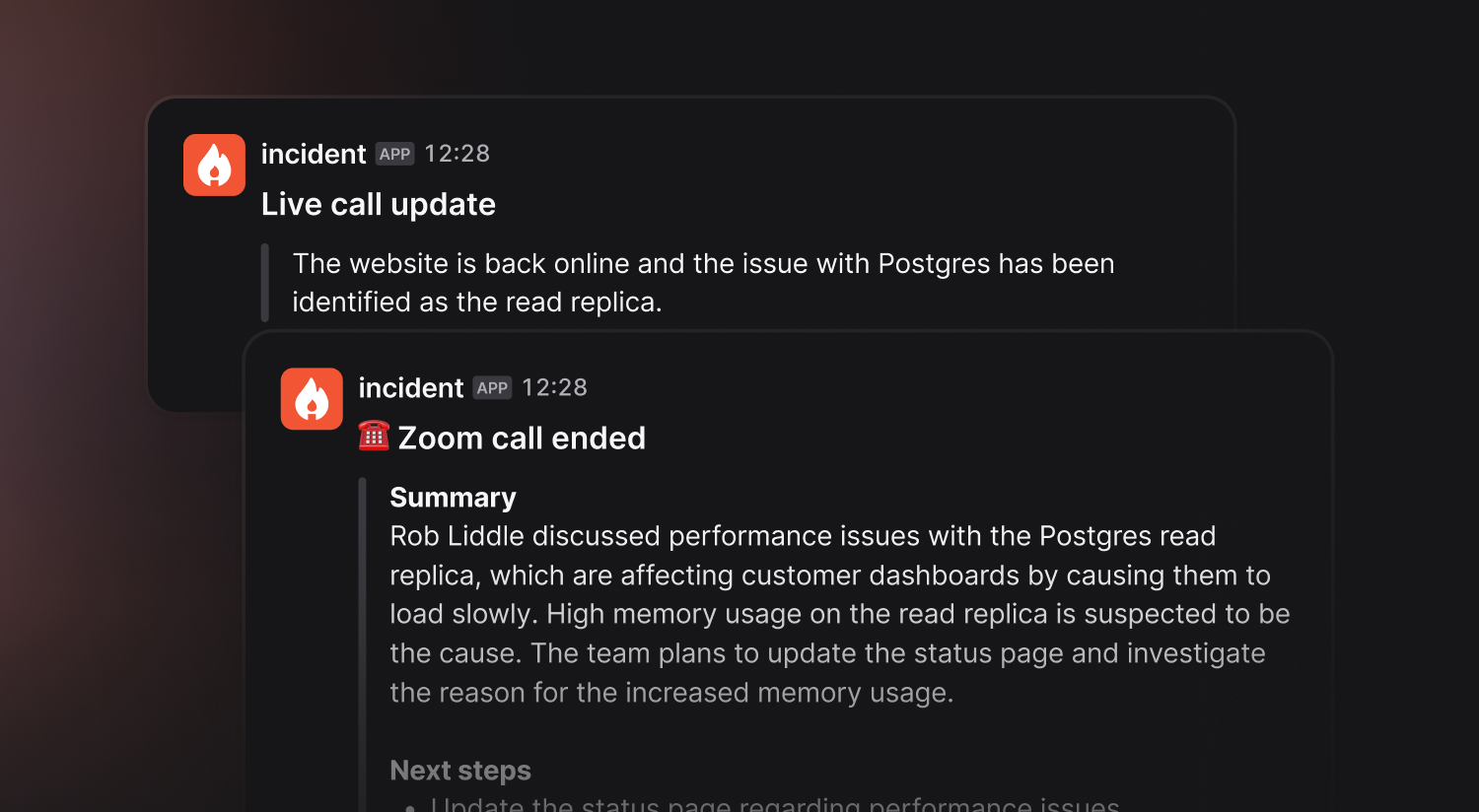
Scribe ensures that no context, crucial information, decisions, or next steps are missed, allowing you to focus on what you do best —resolving the incident.
The whole time Scribe is on the call, it’s constantly sharing updates to help other participants stay up-to-date, and highlighting key moments & decision points as and when they happen. It even surfaces the current conversation topic for all ongoing calls in the incident channel and the dashboard, so everyone can quickly see what’s being discussed, whether they’re on the call, or not.
No more waiting for the end of the call to get a read-out from the team - Scribe keeps you up-to-date with every aspect of the conversation, at all times.
📄 Detailed summaries
Knowing what has happened so far on an incident call allows anyone joining to avoid interrupting others and get quickly up to speed. It can also serve as a reminder for those on the call as to what ideas and next steps they have already discussed.
Scribe generates detailed, structured call notes in real time, featuring sections like “Overview,” “Key moments,” and “Next steps” along with the list of participants.
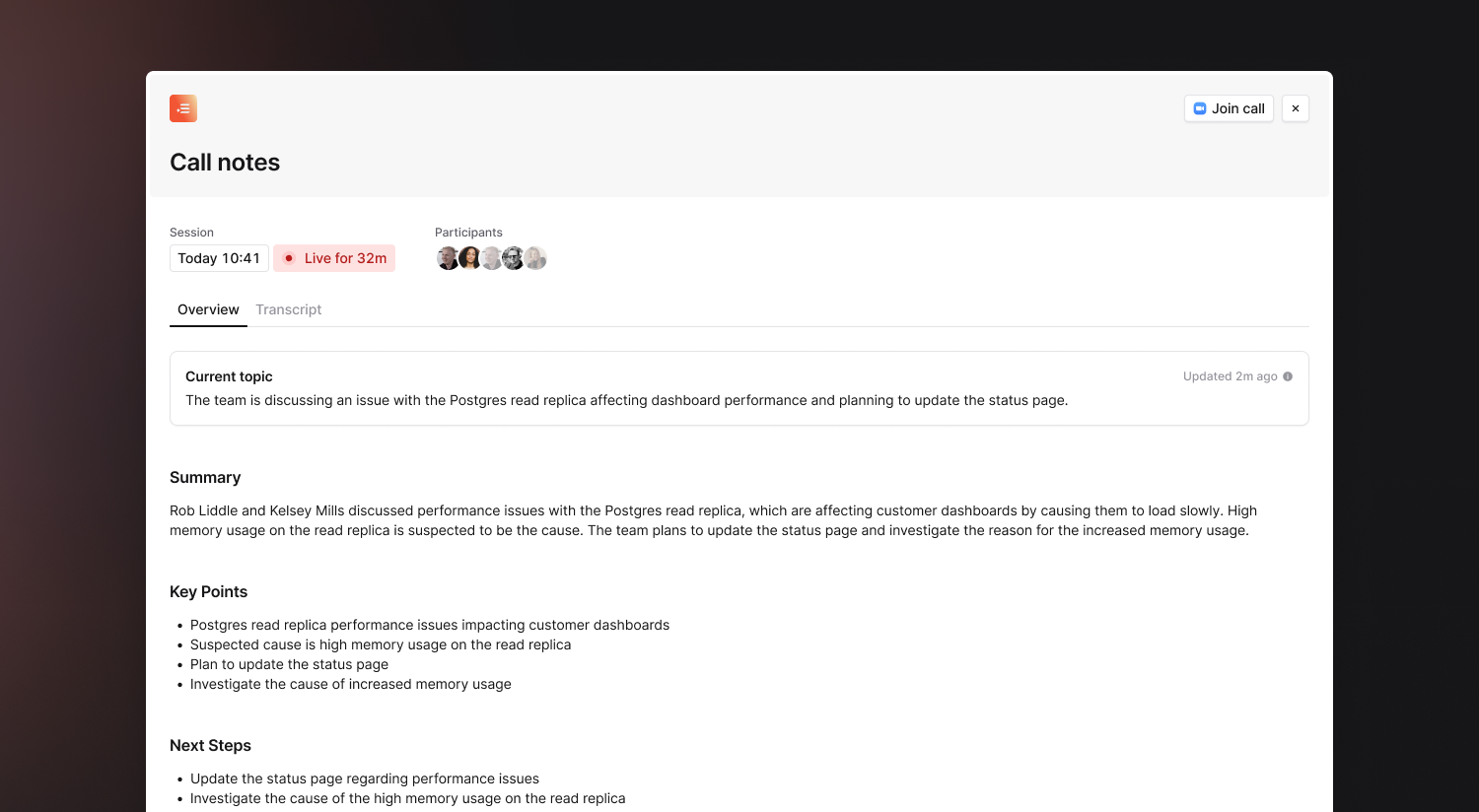
These notes update automatically throughout the call and are available in Slack, Microsoft Teams, and the dashboard.
🔄 Key moments
One of the hardest things to keep track of while working on a call is when decisions have been made, or actions taken.
To help with this, Scribe proactively pulls this information out of the call and pushes it into the incident channel for all to see, as a concise update.
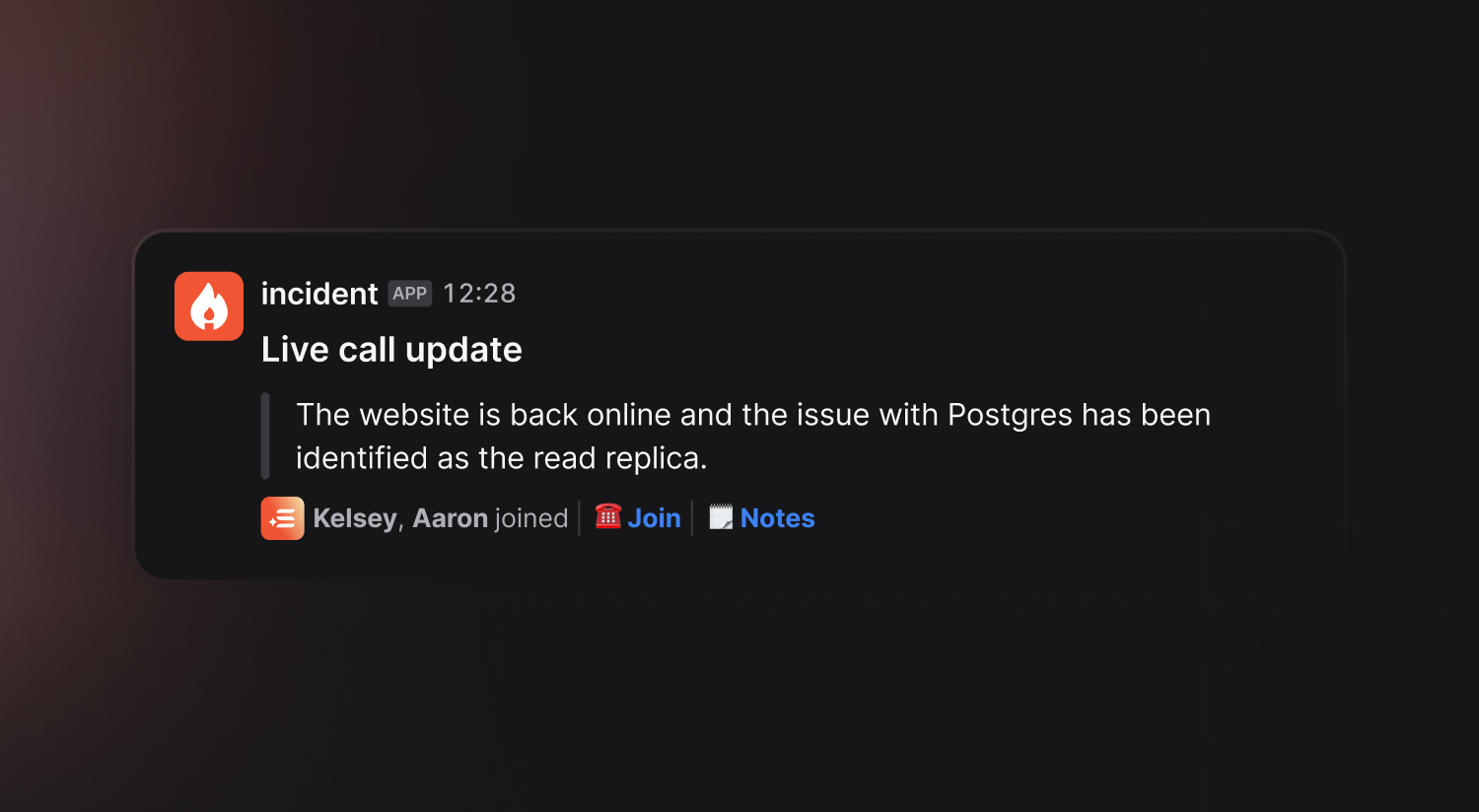
These updates also help build up a detailed picture of the most important moments from a call after the incident, without having to trawl through a long recording or transcript by hand.
💬 Current topic
Incident calls can be overwhelming, and joining a call “just in case” only to find you're not specialized in the current topic can be disruptive. Equally, it can be frustrating to know you could have added value but joined just a little too late.
Scribe addresses this by staying on top of the conversation and summarizing the current topic in real time. This allows you to follow the discussion, without adding unnecessary noise to the call.
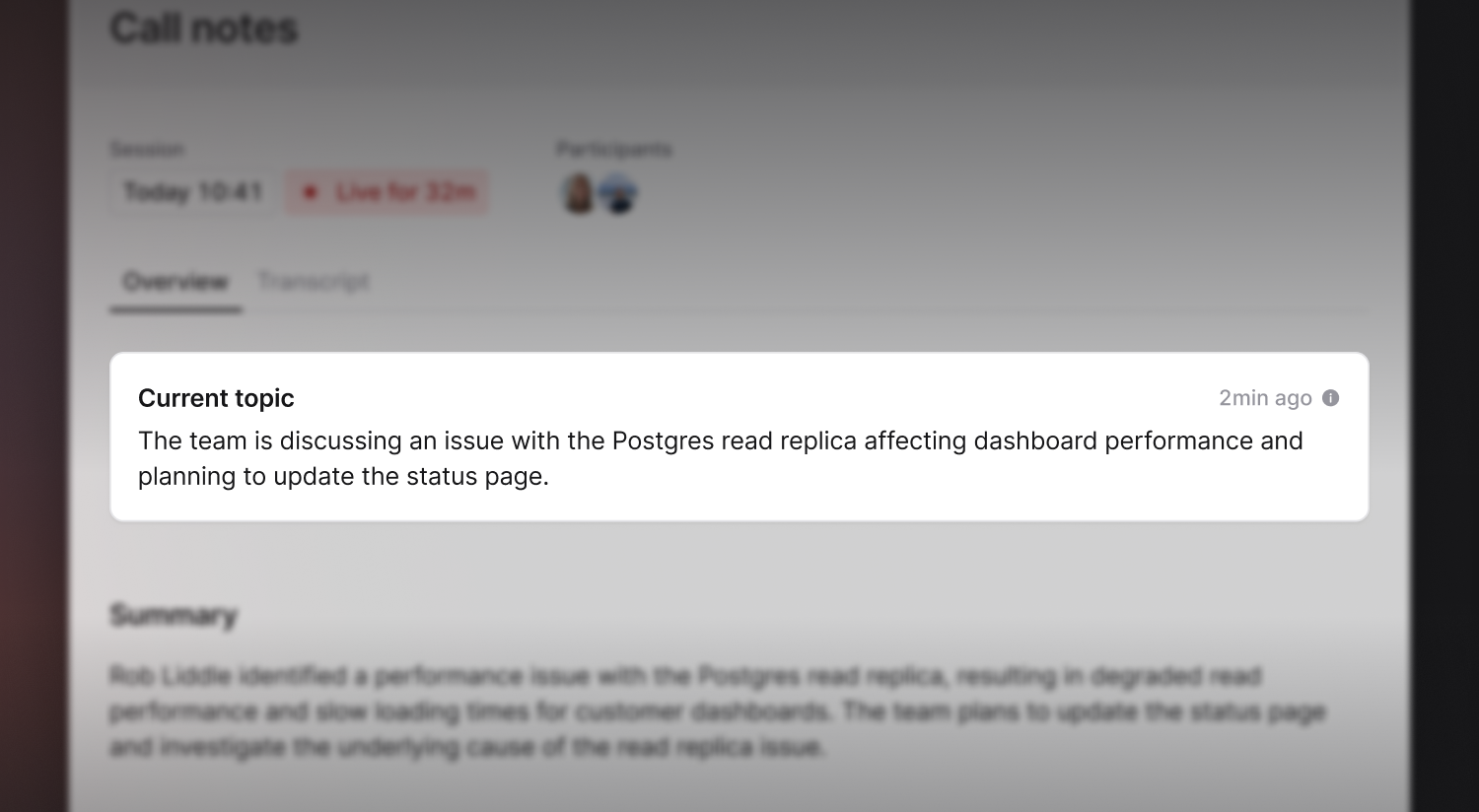
If you know the current discussion is about "Deploying a hotfix," you can choose to join if you have relevant input or concerns, or opt out and leave them to it, if your expertise lies elsewhere.
📋 Integrated transcripts
Along with summaries and key moments, we also allow you to dig into the full transcript, in case you need to review in more detail, or you need a more fine-grained timestamp for when actions were taken or decisions made.
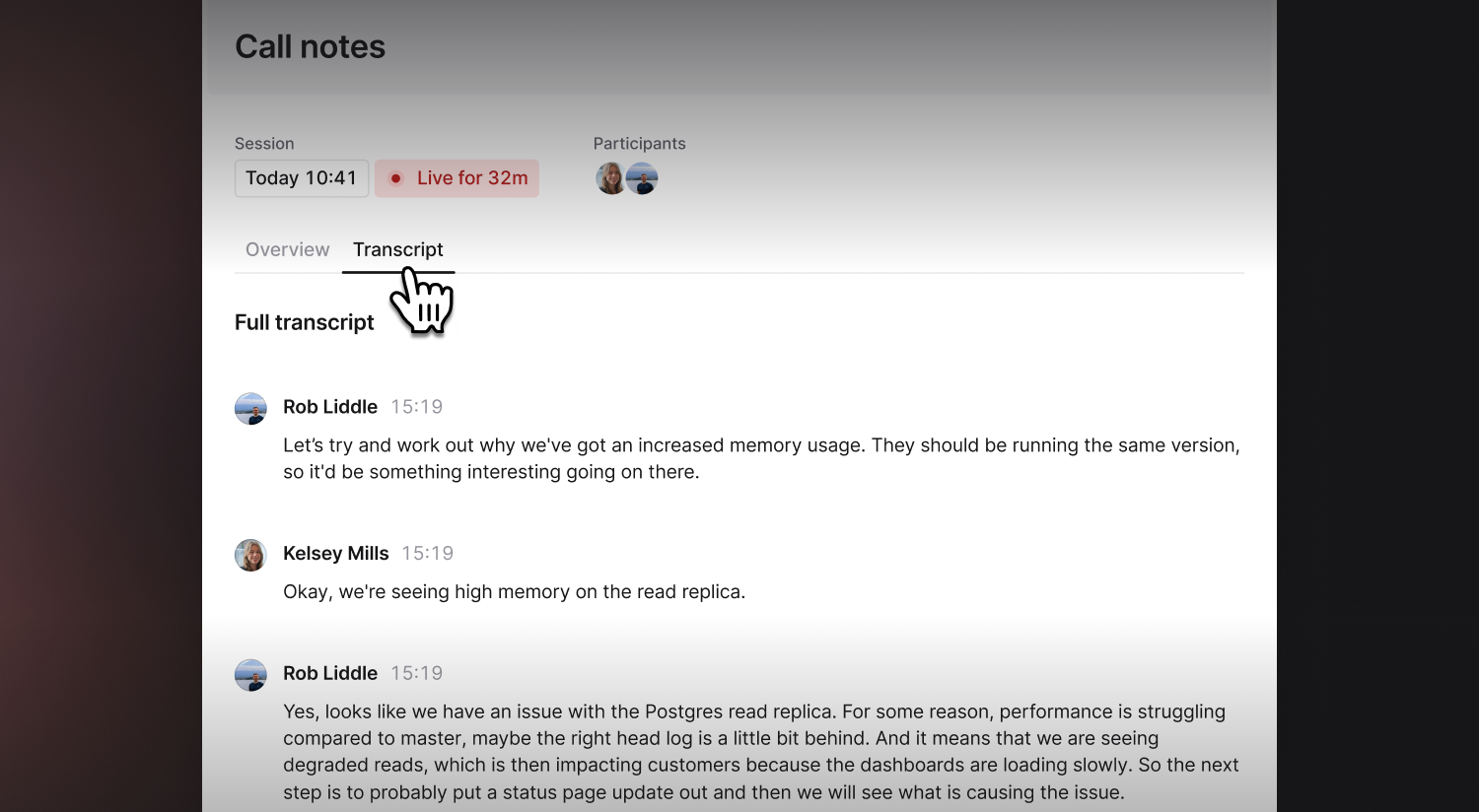
The complete transcripts of these calls provide a historical record of the discussions, enabling you to search for detailed information to include in your debrief or post-mortem analysis.
Getting started with Scribe
For current customers, Scribe is available immediately and can be activated in Settings > AI > Scribe by an Admin or Owner of your account. During your next incident call, Scribe will automatically join, take notes, and share updates.
If you're a prospective customer interested in learning more about Scribe, why not book a demo? Our team would be delighted to show you how it works!
For those who are simply curious, you can explore more about Scribe in our help center article.
🚀 What else we’ve shipped
New
- Status page updates can now also be shared from stream channels
- You can now choose which catalog entries to create sub-pages for when setting up a status page based on a large catalog type
- We now show an alert's deduplication key on its details page
- Exported Linear follow-ups now also include a link to the original URL of the alert that created an incident, if applicable, saving you some clicks in finding the original Sentry issue, or Datadog monitor
- Sentry alert payloads now include contexts, which you can use to store information about things like environment, customer, or user
Improvements
- Our Slack "declare" view no longer (misleadingly) says "press enter to submit”
- Always show the button to edit the status page affected components, instead of only on hover
- We'll no longer use red as a schedule shift color
Bug fixes
- Fixed a bug where the new alerts pulse feature was unavailable for non-on-call customers
- Fixed a bug where we stopped showing related incidents on an escalation's details page
- Fixed a bug where the escalate modal in Slack wasn't respecting escalate configuration for a specific incident type when opened from a quick action
- The "retry" button for failed postmortems now works again
- Fixed a bug where some escalations would send duplicate messages to Slack channels
- Fixed a bug where we didn't have appropriate permissions to sync schedules into Linear's triage scheduling feature
- Fixed a bug where the "when a user acks an escalation" workflow would not run if an escalation was implicitly acked by accepting/merging/declining an incident
- Fixed a bug where we weren't showing the user who acked an escalation if it was implicitly acked by accepting/merging/declining an incident
So good, you’ll break things on purpose
Ready for modern incident management? Book a call with one of our experts today.
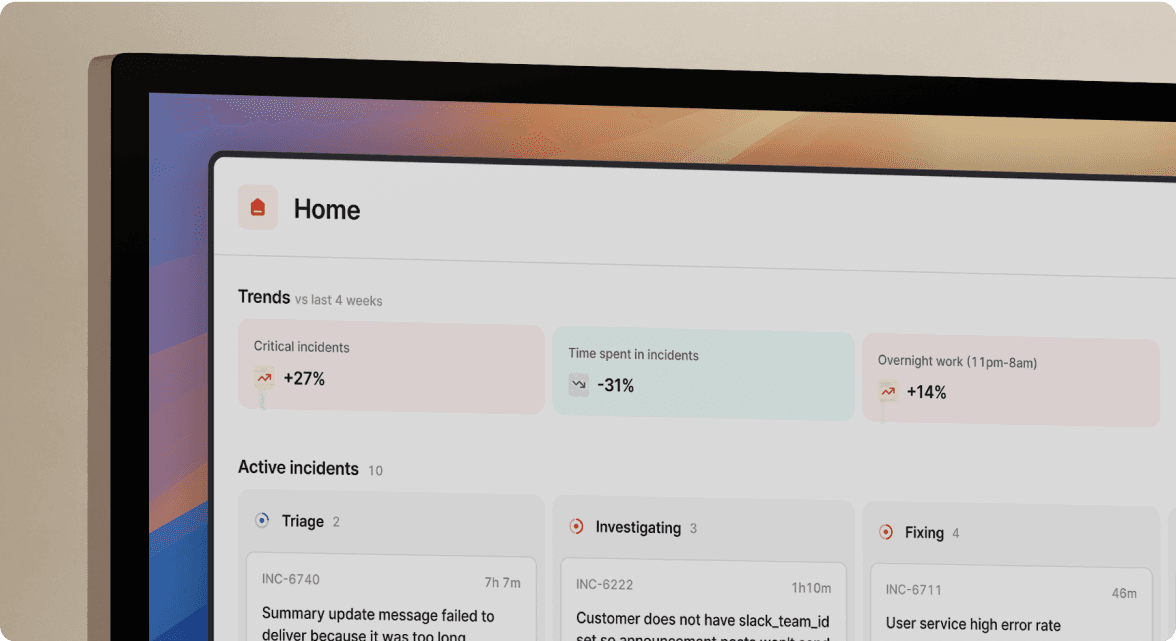
We’d love to talk to you about
- All-in-one incident management
- Our unmatched speed of deployment
- Why we’re loved by users and easily adopted
- How we work for the whole organization



